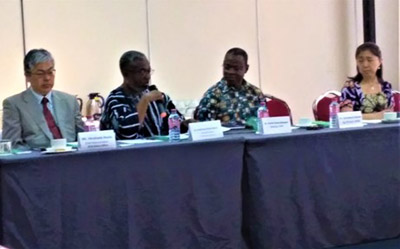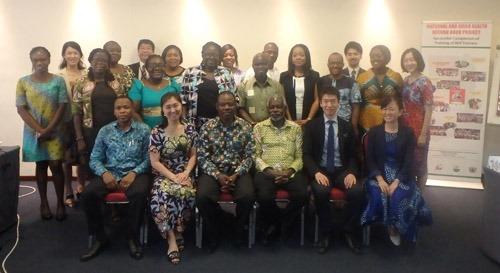Project News
2019-05-03
The second Joint Coordination Committee meeting
The second Joint Coordination Committee (JCC) meeting was held on 3rd May 2019 in Accra, Ghana. Twenty-seven participants from Ghana Health Service Headquarter (GHS), Regional Health Directorate, JICA Ghana office, Teaching Hospital, Nursing and Midwifery Council, Embassy of Japan and JICA experts and national staff attended the meeting. The main agenda of the second JCC meeting was to report the progress of the project and discuss the plans of the project activities for Japanese Fiscal Year 2019.
Opening remarks
In his opening remarks, Dr. Anthony Nsiah-Asare, Project Director, Director General of GHS, commended the efforts of the Family Health Division (FHD), JICA and Embassy of Japan for the Technical Cooperation Project and the achievements attained including the national roll-out and the use of the MCH RB across all regions. He, however, pointed out that some children especially those under the age of two had not received a copy of the MCH RB yet and expressed his concerns on the mal-distribution and the shortage of the book. He emphasized the need to commence domestic resource mobilization, collaborating with the private sector organizations to fund the printing of the MCHRB. In his statement, the Director General urged the Family Health Division to fast-track efforts to ensure that every pregnant woman and a child has a copy of the MCHRB, and to monitor the use of the record book at health facilities across the country.
Mr. Hirofumi Hoshi, Chief Representative, JICA Ghana office, expressed his appreciation to the GHS and MOH for the leadership, commitment, and ownership in the national rollout of the MCH RB. Recognizing the achievement so far, including the development of the User Guide, Training of Trainers conducted in all regions to enhance capacity of health workers and the intensive monitoring and supervision activity that was carried out earlier in the year, he noted that it was a time to discuss how these successful experiences to be sustained in Ghana and he stressed on the importance of discussing the issues on the management and institutionalization of the MCH RB program at this JCC meeting. In light of "Ghana Beyond Aid" agenda, Mr. Hoshi stated that it was necessary for the country to scale-up efforts in domestic resource mobilization, including the private sector engagement.

Overall progress of the project
Dr. Patrick Aboagye, Project Manager, Director of FHS, GHS, presented on the overall progress of the project highlighting major activities conducted and milestones achieved. This project has three main pillars: national rollout of the MCH RB, intensive capacity development in Ashanti Region and the institutionalization of MCH RB. Regarding the national roll-put, a total of 869 facilitators were trained at national, region and district level. After the training, the first national Monitoring and Supervision (M&S) was conducted at 95 facilities in 34 districts in all 10 regions between January to March 2019. (See the project news "The first Monitoring and Supervision in 10 regions") Furthermore, the project printed approximately 440,000 MCHRB so far for the distribution. As for the activities in Ashanti Region, seven focus districts[1] , instead of six, were selected according the selection criteria agreed at the first JCC meeting, and a preparatory workshop was conducted to collect information on current situation of MCH and nutrition in the seven selected districts, towards the baseline survey and situation analysis which was planned to be conducted in July 2019. In terms of the institutionalization of MCH RB, the Management Guide was drafted (see below for details on the Management Guide). Moreover, a team of Ministry of Health and Sanitation, Sierra Leone, has visited Ghana to discuss issues on the implementation and the challenges of the national rollout of the MCH RB in March. (See the project news "Ghana and Sierra Leone Knowledge Co-Creating Seminar on MCH handbook")
Findings of the monitoring and supervision with recommendations
On behalf of the technical team, Ms. Vivian Ofori Dankwah, Safe Motherhood Programme Officer, FHD, GHS, presented on the key findings from the first M&S visits conducted across the country with recommendations. The M&S report pointed out that MCH RB was mainly distributed to pregnant women at the first visit due to insufficient number and the management of the distribution criteria of the MCHRB. There was a difference in number of the received and distributed books at regional and district level because of the poor stock management. Training was disproportionally conducted to the midwives at the PHC level and the majority of midwives working at major hospitals haven't received any training on the MCHRB and nutrition counseling, which was a new service introduced with MCHRB. It was recommended to conduct advocacy for printing of the books, to develop the management guide, to strengthen the stock management system and to provide opportunities of capacity development to health workers, especially midwives at major hospitals.
Brief report on the Ashanti workshop and the progress of the baseline survey and situation analysis
Ms. Esi Amoaful, Deputy Director, Nutrition, FHD, GHS, reported the preparation workshops conducted in Kumasi (Ashanti Region) as well as the progress of the baseline survey and situation analysis in Ashanti Region. The main objectives of the study were to assess key outputs and outcomes of the project intervention and to identify current situation and challenges on maternal and child health and nutrition. The survey will be conducted in July 2019 at three study districts and three control districts, with the pretested questionnaire, in-depth interviews and focus group discussions with pregnant women, mothers and health workers.
Proposed plan of activities for April 2019 to March 2020
Ms. Esi Amoaful and Dr. Akiko Hagiwara, Chief Advisor of the project, presented the planned activities for April 2019- March 2020. Regarding the national roll-out, the project continues the development of audiovisual learning material, and conducts the training for health workers at major hospitals. As for the activities in Ashanti Region, after the baseline survey and situation analysis mentioned above, the trainings for health workers will be conducted in 11 districts. In term of the institutionalization, a series of workshops will be conducted for the development of the management guide. Also, some sensitization activities for local governments and private sector will be conducted.
Discussion on the sustainability
As Director General of GHS and the Chief Representative of JICA Ghana office stressed in their remarks, the discussion on the sustainability of the MCH RB were taken place. Dr. Isabella Sagoe-Moses presented planned activities related to the management and regulations on the MCH RB. She explained that the development of the Management Guide will go through a process which will involve all major stakeholders and the stakeholder workshops will be conducted to brainstorm the contents of the Guide. Separate meetings will be also held to share the proposed contents with key actors, such as relevant public organizations (Ministries, Department and Agencies: MDAs), the private sector and development partners to get buy-in. The Management Guide includes guidelines on procurement/printing, revision, branding of the MCHRB, and the logistic management. Dr. Aboagye stressed the importance of protecting the contents of the MCH RB when it is printed by the third party and said no one would be allowed to alter the content without prior approval from GHS. Dr. Hagiwara mentioned that the management guide will define how the contents of the MCH RB should be protected as a national standard. She also added that the specification and contents of the MCH RB should be further protected with the laws and regulations in a long run as the MCH handbook is protected by the MCH law in Japan. Regarding the sustainability of the printing, there was a various recommendation such as: domestic resource mobilization including engagement with development partners and private sector as well as the engagement of the National Health Insurance Authority. In terms of the sustainability of the capacity development, there was an idea to integrate the MCH RB training into the preservice training of nurses and midwives during the revision of the curriculum this year.
Way forward
The JCC meeting was a good opportunity for all the concerned people to discuss and make consensus on the project plan. It was significant to start detail discussion on the sustainability of the MCH RB program. The 3rd JCC meeting will be conducted in November 2019.

Note
- [1] One district was added to 6 focus districts in order to include WHO learning sites of maternal and child care quality initiative. The focus districts are Atwima Mponua, Atwima Nwabiagya, Amansie West, Amansie Central, Adansi North, Adansi South and Atwima Kwanwoma.
- About JICA
- News & Features
- Countries & Regions
- Our Work
- Thematic Issues
- Types of Assistance
- Partnerships with Other Development Partners
- Climate Change / Environmental and Social Considerations
- Evaluations
- Compliance and Anti-corruption
- Science and Technology Cooperation on Global Issues
- Research
- JICA Development Studies Program / JICA Chair
- Support for the Acceptance of Foreign HRs / Multicultural and Inclusive Community
- Publications
- Investor Relations
